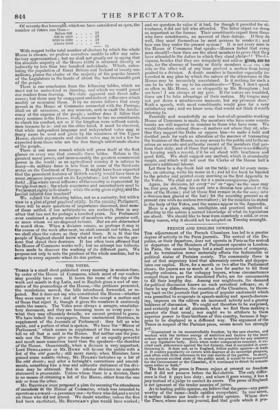THE VOTES. - TITERS is a small sheet published every morning
in session-time, by order of the House of Commons, which most of our readers may possibly have seen. It bears the name of the day of the • week and month in dog Latin, and in English gives a sort of nar- rative of the proceedings of the House,—the petitions' presented, the resolutions moved, the hills introduced, forwarded, or re- jected. . But it does not say who constituted the House—whether they were many or few : and of those who accept a motion and of those that reject it, though it gives the numbers it cautiously • omits the names. The Votes were always a meagre, unsatisfac- tory document, and they are becoming more so every year: to what they may ultimately dwindle, we' cannot pretend to guess. We have indeed the newspapers, those unchartered libertines, in supplement of the Journals of Parliament: they tell us who speak, and a portion of what is spoken. We have the " Mirror of Parliament," which comes in supplement of the newspapers, to • tell es all that is said in the House. But neither can the jour- nals nor the Mirror give us the names of an equally powerful and much more numerous band than the speakers—the dumbies of the'House. Occasionally, when a division is very important, Lord DIJNOANNox or Mr. HUME will favour the public with a list of the ct;te gauche; still more rarely, when Ministers have gained some' notable victory, Mr. HOLMES furbishes up a list of the Me droite ; and after a fortnight's corrections and amend- ments, something like a true and authentic statement of the divi- sion may be 'obtained. But in inferior divisions no complete statement is procurable. Unless where there is a division, there is no means of obtaining a list of the House, either from the one side or from the other: Mr. Baeriii,im 'once proposed a plan for securing the attendance of znembeir in the House,.of Commons, which wasintended to operate as a reward—a pecuniary one—to those who did,and a mulct on those who did not attend. We doubt whether, unless the fine had been exorbitant, Mr. BEemiste's plan would have worked; and we question its value if it had, for though it provided for at- tendance, it did not tell who attended. The latter object we deem as important as the former. Their constituents expect from those who have constituents, an account of their doings. If they do well, they must themselves be most anxious to render it; and how can they under the present system? It is not every man in the House of Commons that speaks—Heaven forbid that every 'man should!—how then are the silent members to prove that they have attended to the duties to which they stand pledged ? The d visions, besides that they are irregularly and seldom given, are no rule, for the absence of twenty or thirty members iinai uie the side or the other will at any time prevent a motion from being pushed to a division. A dumb member is therefore especially in- terested in any plan by which the nature of the attendance in the House may be accurately ascertained. Is it nothing for such a one to be able to say to his constituents—" True, I don't speak so often as Mr. Hume, or so eloquently as Mr. Brougham ; . but see here ! I am always at my post. If the waters are troubled, there am I to take advantage of their motion. My tongue may not put down a mischievous measure, but my presence does." Such a speech, with most constituents, would pass for a very satisfactory one ; and we know none that would not think it worth listening to. Fearfully and wonderfully as our best-of-all-possible-working House' of 'Commons is made, the members who have some consti- tuents are still superior in number to those who have none. We would therefore: entreat them—it matters not where they sit, whe- ther they support the Diike or oppose him—to make a bold and decided push for such an alteration of the manner of transacting the business of the House, as may secure to the public and to them- selves an accurate and authentic record of the members that per- form their duty, and of those that neglect it. There is no difficulty in keeping such a record, if it be set about with heartiness' and good faith. We shall suggest one method, which is abundantly simple, and which will not cost the Clerks of the House half a minute's additional labour.
Let there be a day-book laid on the table ; and let every mem- ber, on entering, write his name in it ; and let the book be handed to the printer and printed every morning as the first AppendiX to the Votes. We shall not ask for it a more conspicuous place.' Again, for divisions, let every " no". or- " aye,7.',as -the case may be, that goes out, drop his card into a division-box placed at the • door of the and let those that remain the same into e. division-box placed at the bal.;-'ret the -counting- proceed as at present (we wish:no nselees innovation) .; let the numberi. be stated in the body of the Votes, and the names-appear in the Appendix. Here is a plain, simple, intelligible, and practical method of affordine•b to. the nation a correaknowledge of what its legislators are about. We should like to hear from somebody a solid, or even flimsy reason, why it should not be adopted on Tuesday sennight..


























 Previous page
Previous page